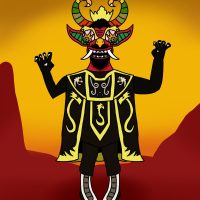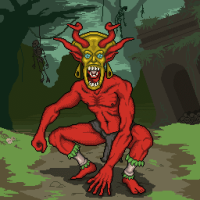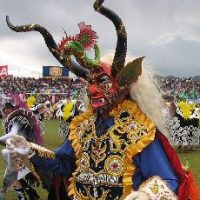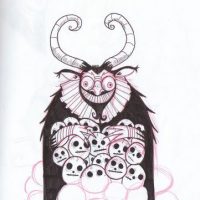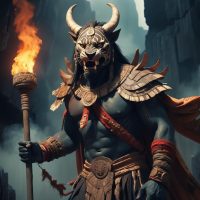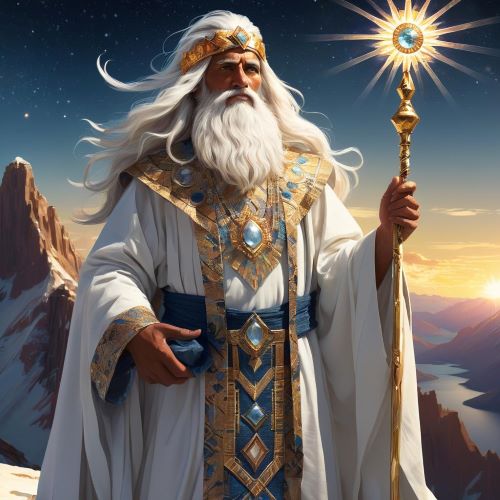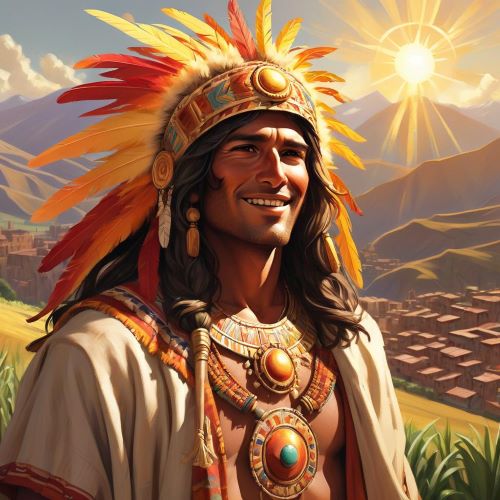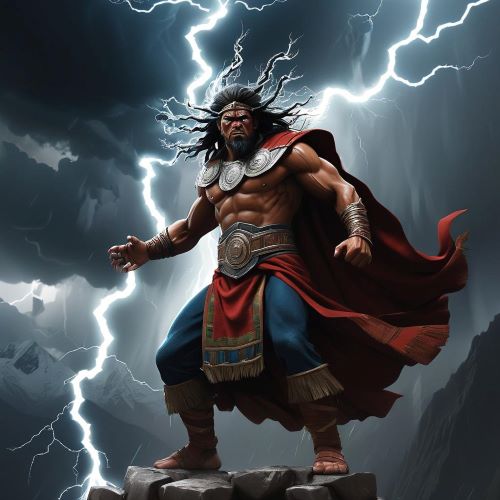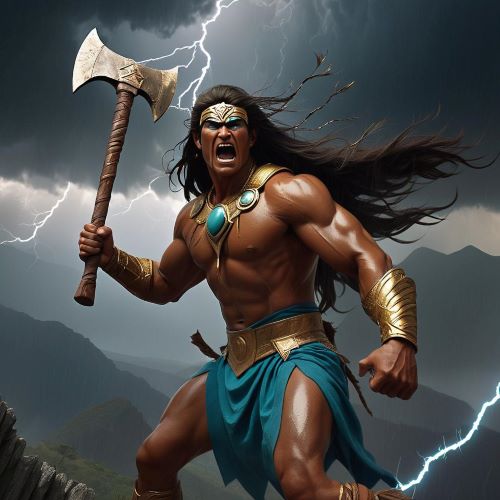Supay : God of Death
Listen
At a glance
| Description | |
|---|---|
| Origin | Inca Mythology |
| Classification | Gods |
| Family Members | N/A |
| Region | Peru |
| Associated With | Death, Afterlife |
Supay
Introduction
Supay, an eminent deity in Inca mythology, holds sway as the god of death, his roots deeply entwined with the ancient Inca civilization of Peru. Revered and feared in equal measure, he commands the underworld, known as Uku Pacha. His prominence underscores the intricate cosmology and spiritual convictions prevalent among the Andean peoples. Esteemed as the sovereign of the underworld, Supay embodies both reverence and trepidation within Inca mythology. Not merely confined to death’s embodiment, he also reigns over the depths of Ukhu Pacha and leads a legion of demons.
Physical Traits
Depictions of Supay exhibit a spectrum of interpretations, yet certain recurrent features persist. Often depicted as formidable, he bears a dark complexion and a stern visage, fitting for his dominion over the underworld. Symbolic regalia like crowns and scepters denote his authority over the realm of the deceased. Additionally, motifs of death and rebirth, such as skeletal elements and serpents, emphasize his control over life’s cyclical essence.
Supay’s imagery ranges from a fearsome jaguar-headed figure to a powerful humanoid form with jaguar and puma attributes, symbolizing his ferocity and prowess. His ability to shapeshift into various forms, including those of Inca individuals or animals, adds to his mystique and unpredictability. Such representations underscore Supay’s formidable nature, instilling both fear and awe in those who encounter him within the mythological realm.
Family
In Inca mythology, Supay shares associations with Mama Pacha, the earth goddess, and Inti, the sun god. As the underworld’s ruler, Supay guides departed souls through the afterlife, often depicted as Pachamama’s spouse, solidifying his ties to the earth’s cycles. Despite his imposing demeanor, Supay is intricately interwoven into Inca mythology’s familial tapestry, playing a pivotal role in the universe’s cosmic order. While specific family ties for Supay are scarce in available sources, there are implications of a connection to Viracocha, the creator deity. Supay likely held sway over a host of lesser demons or spirits dwelling in Ukhu Pacha, serving under his command.
Other names
Supay’s etymology derives from the Quechua language spoken by the Inca populace. Variations such as Supay Wira (Lord Supay) and Supay Illapa (Thunder Supay) hint at possible connections to thunder and lightning deities. Post-Spanish conquest, Christian missionaries equated “Supay” with the devil, blurring distinctions between the two figures. However, indigenous perspectives continued to regard Supay distinctively, recognizing his power without demonization.
Supay, primarily known as the god of death in Inca mythology, doesn’t solely adhere to a single name. While “Supay” is prevalent, regional and cultural nuances within the Inca empire offer alternative appellations. In some Quechua-speaking communities, he’s referred to as Uku Pacha, emphasizing his underworld sovereignty. Other names like Achachila underscore his ancestral spirit status, while Wari highlights associations with death and transformation.
Powers and Abilities
Supay reigns over the underworld and leads a cohort of demons, yet the Inca people didn’t perceive him negatively despite his association with death and suffering. Instead, they revered the underground waters of Uku Pacha, Supay’s domain, as a wellspring of life linking the human and inner worlds. His influence extended beyond myth, impacting practical domains like mining and agriculture. Rituals tied to Supay held significance for these professions, reflecting his sway over their realms.
As the underworld’s ruler, Supay commands respect and fear with his diverse powers. Foremost among these is his dominion over souls, guiding them through the afterlife’s intricate passages. Supay’s influence stretches to the cycle of life and death, ensuring continuity for all living beings. Additionally, he’s invoked in fertility and agricultural rites, symbolizing death’s transformative force in the natural order.
Wielding immense authority over Ukhu Pacha, Supay guides departed souls and determines their fate. Linked to natural calamities, particularly earthquakes, seen as bridges between the living and Ukhu Pacha, he receives sacrifices from Inca miners to ensure safety during subterranean expeditions.
In contrast to the Christian notion of hell, Ukhu Pacha wasn’t solely punitive; rather, it mirrored earthly life. Virtuous individuals enjoyed peace in the afterlife, while the wicked faced adversity. Supay, therefore, embodied not pure evil but the natural cycle of life and death, embodying a potent force in Inca belief.
The Capacocha ritual, a complex Inca practice, involved sacrificing children to appease Supay, ensuring the empire’s prosperity. This ritual underscores the Inca’s belief in maintaining harmony between the living world and the underworld, acknowledging Supay’s power and the need to honor it through offerings and ceremonies.
Modern Day Influence
Despite Spanish colonization and the spread of Christian beliefs, indigenous Peruvians continued to seek Supay’s protection. Andean carnivals, especially in Bolivia, Chile, and Peru, prominently feature Supay, emphasizing his enduring significance in regional culture. His domain over death, mining, and agriculture remains integral to his mythology, persisting into the present day.
Supay’s influence permeates modern Andean culture, inspiring artists, writers, and musicians across various mediums. His depiction in paintings, sculptures, and theatrical performances reflects the duality inherent in his character. In contemporary video games and role-playing scenarios, Supay often assumes the role of a formidable figure, underscoring his enduring allure as a symbol of power and mystery.
Spanish conquest in the 16th century drastically reshaped Inca mythology. Missionaries portrayed Supay as the Christian devil, aiming to convert indigenous populations to Catholicism. This vilification obscured Supay’s original complex role in Inca cosmology, erasing the nuanced understanding of his character.
Despite Spanish influence, Supay’s legacy endures in the Andean region. Traditional practices and folklore still contain elements of Supay worship and beliefs about the underworld. Festivals like La Candelaria in Puno, Peru, showcase vibrant dances featuring characters representing Supay, illustrating his lasting presence in Andean culture.
Related Images
Frequently Asked Questions
What is lorem Ipsum?
I am text block. Click edit button to change this text. Lorem ipsum dolor sit amet, consectetur adipiscing elit. Ut elit tellus, luctus nec ullamcorper mattis, pulvinar dapibus leo.
What is lorem Ipsum?
I am text block. Click edit button to change this text. Lorem ipsum dolor sit amet, consectetur adipiscing elit. Ut elit tellus, luctus nec ullamcorper mattis, pulvinar dapibus leo.
What is lorem Ipsum?
I am text block. Click edit button to change this text. Lorem ipsum dolor sit amet, consectetur adipiscing elit. Ut elit tellus, luctus nec ullamcorper mattis, pulvinar dapibus leo.
What is lorem Ipsum?
I am text block. Click edit button to change this text. Lorem ipsum dolor sit amet, consectetur adipiscing elit. Ut elit tellus, luctus nec ullamcorper mattis, pulvinar dapibus leo.
What is lorem Ipsum?
I am text block. Click edit button to change this text. Lorem ipsum dolor sit amet, consectetur adipiscing elit. Ut elit tellus, luctus nec ullamcorper mattis, pulvinar dapibus leo.


